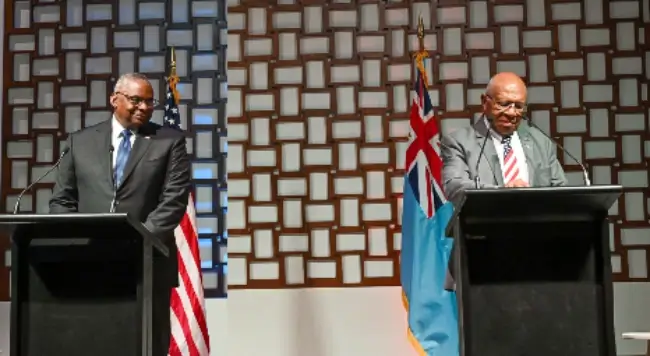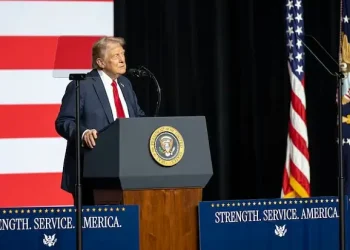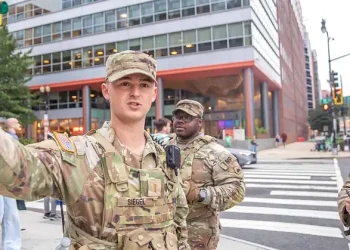The U.S. continues to strengthen its role as a steadfast partner in the Indo-Pacific region. Secretary of Defense Lloyd J. Austin III wrapped up his 12th trip to the area with a landmark agreement in Fiji.
This journey underscores America’s growing collaboration with regional allies, bolstering security, disaster response, and collective efforts for a free and open Indo-Pacific.
Enhancing Cooperation with Fiji
In a historic move, Secretary Austin signed the Acquisition and Cross-Servicing Agreement (ACSA) with Fiji. This pact allows the U.S. and Fiji to exchange vital resources like fuel and medical supplies and access maintenance facilities during emergencies.
Negotiated over nearly a decade, it solidifies a deeper logistical bond between the two nations.
- Why it matters:
- Facilitates quicker responses to humanitarian crises.
- Strengthens the resilience of both nations in regional security efforts.
During the signing ceremony at Black Rock Camp, Austin also announced the start of negotiations on a Status of Forces Agreement (SOFA).
This deal, once finalized, will empower closer military collaboration. Additionally, Fiji is set to receive $4.9 million in U.S. funding for modernizing small-arms capabilities, pending Congressional approval.
Austin’s visit marked a significant step forward in the U.S.-Fijian relationship, with shared values and a vision for stability guiding the partnership.
Momentum Across the Indo-Pacific
Austin’s journey didn’t stop in Fiji. The secretary met with leaders and defense counterparts across the region, showcasing the U.S.’s commitment to fostering enduring alliances.
Australia: Strengthening Trilateral Defense
In Darwin, Austin joined defense ministers from Japan and Australia for the 14th Trilateral Defense Ministers’ Meeting.
The outcomes included:
- Japan increasing participation in U.S.-Australia force posture activities.
- Expanded intelligence sharing between the three nations.
These steps aim to enhance readiness and security across the Indo-Pacific while setting a precedent for deeper trilateral military cooperation.
Philippines: Historic Developments
Austin’s visit to the Philippines underscored the country’s pivotal role in the U.S.’s Indo-Pacific strategy. He oversaw the signing of the General Security of Military Information Agreement (GSOMIA), enabling expanded technology and intelligence sharing.
- Notable achievements:
- Groundbreaking for a new coordination center at Camp Aguinaldo in Manila.
- Demonstration of the T-12 unmanned surface vessel technology provided by the U.S.
The Philippines’ strengthened capability in the South China Sea underscores the U.S.’s commitment to its regional allies’ sovereignty and defense.
Reaffirming Regional Commitments
At the ASEAN Defense Ministers’ Meeting-Plus in Laos, Secretary Austin unveiled the first-ever U.S. Department of Defense vision statement for Southeast Asia. This blueprint emphasizes deepening cooperation with ASEAN nations to foster regional stability and prosperity.
Additionally, Austin announced a second iteration of the U.S.-led maritime exercises with ASEAN nations, a continuation of the successful program launched in 2019. These engagements spotlight the U.S.’s role in maintaining free and secure maritime operations.
Broader Implications for the Indo-Pacific
Secretary Austin’s 12th trip highlighted the United States’ strategic priorities: enhancing alliances, reinforcing shared values, and ensuring the Indo-Pacific remains open and prosperous.
Through agreements like ACSA and initiatives in Australia, the Philippines, and ASEAN, the U.S. is charting a path of collaboration and mutual support.
Regional Impact Highlights:
- Increased disaster relief readiness: Enhanced logistics through agreements with Fiji.
- Improved security operations: New frameworks in Australia and the Philippines.
- Broader maritime cooperation: Expanded exercises with ASEAN nations.
These developments align with the U.S. vision of supporting like-minded partners to navigate geopolitical challenges in the region.
Final Thoughts
Secretary Austin’s Indo-Pacific engagements reaffirm America’s unwavering commitment to the region. From historic agreements in Fiji to trilateral cooperation with Australia and Japan, the U.S. is investing in partnerships that ensure shared security and prosperity.
As the Indo-Pacific evolves, this visit cements the U.S. as a trusted ally and proactive leader in fostering stability and collaboration.
Sources: THX News & US Department of Defense.









